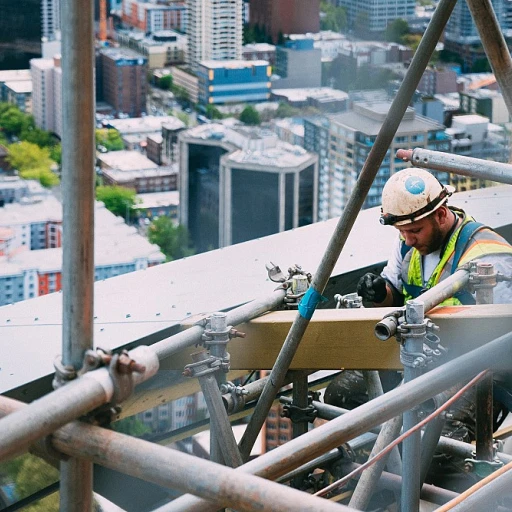Cultural Influences on Business Hierarchy in Peru
The Influence of Cultural Roots in Business Structure
Understanding the intricate web of business hierarchy in Peru requires a deep dive into the country's rich cultural roots. Peru's organizational structure is a reflection of its diverse cultural landscape, where ethnic groups such as the Quechua and Aymara contribute significantly to the social fabric. The Peruvian society, deeply influenced by indigenous practices and Spanish colonial history, shapes its business culture.
Building relationships is paramount in any business setting, and this is especially true in Peru, where personal relationships often take precedence over professional ones. The focus on relationship building stems from the interdependency among people, a characteristic feature of the Peruvian culture. Social and family ties play a crucial role in the decision-making process, emphasizing the importance of personal relationships over rigid chain of command systems typically observed in Western organizations.
Peruvians tend to value long term relationships, prioritizing trust and loyalty within the business environment. Such cultural considerations can often influence the decision-making process, impacting the hierarchy and how companies operate in the long run. Business meetings in Peru are therefore more than mere discussions of business matters; they are an opportunity to build and nurture these essential relationships.
The informal yet personal way in which Peruvians conduct business meetings reflects their appreciation for these relationship-based interactions. This cultural nuance is evident in both urban and rural areas of the country, although the latter might exhibit more traditional customs. For those wishing to navigate the business peruvian landscape, understanding these subtle cultural influences is vital for effective relationship building and successful integration into the business hierarchy.
Explore more about businesses thriving in such environments
here.
Leadership Styles in Peruvian Companies
Exploring Leadership Frameworks in Peru
Peruvian business culture is deeply influenced by its historical context, and this reflects in the leadership styles prevalent in companies across the country. Understanding these styles requires a nuanced view of how cultural, social, and familial factors integrate to shape effective organizational structures.
The leadership in Peru often mirrors the country's traditional societal hierarchy. The influence of ethnic groups such as the Quechua and Aymara, coupled with Spanish colonial heritage, fosters a complex leadership matrix that emphasizes respect for authority and age. Such dynamics set the tone for a vertical chain of command, where decision-making is typically centralized at the top levels of management.
Peruvian leaders like to cultivate personal relationships within their business environment, acknowledging the importance of family and social bonds in forming trust. This personal touch in leadership translates to the art of relationship building, where face-to-face interactions and personal engagements are often preferred over formal correspondence.
In this South American nation, leadership is not just about the position one holds within an organization but also about the personal influence one wields. This high-context approach means that effective leaders are expected to exhibit a paternalistic style, offering guidance and mentorship akin to the role of a family head.
While the traditional frameworks continue to dominate, modern business leaders in Peru are slowly adapting to global management trends. Some companies are starting to blend these with more collaborative and inclusive practices, aiming for a balanced approach that respects cultural roots while responding to contemporary business demands.
For more on how leadership styles can be crafted to align with these cultural specifics, you can explore the insights on
crafting an effective leader profile report, which provide valuable guidance tailored to the Peruvian context.
Communication Patterns in Peruvian Business
Effective Communication: Navigating Peruvian Business Culture
In understanding the dynamics of communication within Peruvian business settings, one must consider the intricate influence of culture on interactions and dialogue. The social context in which messages are conveyed bears significant weight in this South American country, deeply shaping how ideas are exchanged within the organization.
Peru's business culture often operates under a high-context communication style, where meanings are primarily derived from nonverbal cues and the general understanding shared among those in the conversation. In this respect, implicit communication becomes just as important as the words themselves, emphasizing the need for perceptive listening and observation.
Peruvian Spanish differs in its formality, offering variations that may impact business meetings where language nuances play a critical role in decision making. In such settings, the chain of command is usually respected, which brings another layer of complexity to interaction.
Employees in Peruvian companies often prioritize harmony and maintaining positive personal relationships over direct confrontation or bluntness. This is not just a cultural inclination but a necessary approach for long-term success in building trust and collaboration within their personal and business relationships.
The role of family and social networks is also significant. Given Peru's societal structure, it’s common to see personal and family relationships influence business communication. In many cases, established networks related by blood or marriage can affect the flow of information and the efficiency of business processes.
For foreigners, navigating this cultural landscape requires sensitivity and patience. Understanding these cultural considerations helps in making the conversation more fluid and effective, ensuring that communication aligns well with local practices and expectations.
If you're involved in an international project, consider how these cultural aspects may impact your overall organizational structure and outcomes. Learn more about how a
certificate of completion serves across cultural contexts, particularly in sectors requiring stringent project alignment.
Role of Family and Personal Relationships
Importance of Personal and Family Connections
In the vibrant tapestry of Peruvian business culture, personal and family relationships play a pivotal role. Unlike in some Western countries where professional boundaries are more strictly defined, in Peru, personal connections often influence business decisions. This can be attributed to the strong cultural emphasis on social networks and trust that permeates various aspects of life, from urban centers to rural areas.
The Peruvian society places high value on family ties and social networks. This is evident in business settings where trustworthiness and reliability are associated with familial and personal connections. Such relationships often serve as the backbone of long-term partnerships and collaborations. The familial hierarchy can be reflected in business hierarchies, with family members often holding key positions within the organization.
Social Network Influence
The influence of social networks extends beyond family ties. In Peru, relationships built over time are crucial in navigating the business landscape. Whether in bustling city settings or among ethnic groups such as the Quechua and Aymara in rural areas, relationship building is an essential business practice.
In the context of business meetings, it is common for Peruvians to dedicate time to nurturing relationships before proceeding to formal discussions. This practice underscores the importance of understanding the cultural considerations that are unique to Peru’s business environment.
Navigating the Hierarchical Structure
The hierarchical nature of Peruvian organizations means that most decisions pass through a chain of command. Personal relationships often facilitate smoother navigation of this structure, as individuals in decision-making positions may prioritize stakeholders they trust.
Cultural influences further impact the chain of command, with respect for authority figures deeply ingrained in the population. This cultural dynamic underscores the significance of maintaining respectful and genuine relationships throughout the organizational structure.
In essence, personal and family relationships are integral to the business hierarchy in Peru. Whether through social networks or familial ties, these connections profoundly impact business practices and organizational structure, shaping how business is conducted in this South American country.
Challenges in Implementing Global Management Practices
Global Management Practices: A Complex Integration
Incorporating global management practices in Peru presents a unique set of challenges, primarily due to the intricate blend of cultural traditions and business customs. Peruvian business often revolves around deeply-rooted cultural norms that shape the organizational structure within companies. Consequently, these norms can sometimes clash with the more standardized global practices that businesses worldwide seek to implement.
Firstly, the hierarchical structure prevalent in many Peruvian organizations—a remnant of the country's historical influences—can impede the adoption of more egalitarian management approaches. In Peruvian culture, respect for authority figures and a clear chain of command are integral to business operations. This hierarchical mindset can sometimes slow down decision-making processes, as it requires input and approval from higher-ups before progressing.
Additionally, the importance placed on personal relationships in business Peru cannot be understated. These relationships often surpass professional connections, impacting both daily operations and long-term strategic decisions within a company. The emphasis on social and family ties can create a resistance to changes that disrupt established personal networks and could make global practices less appealing or harder to implement.
The language barrier also poses a challenge. While many Peruvians in the business sector may speak Spanish, and some may even have proficiency in English, the majority of the rural population speaks indigenous languages like Quechua and Aymara. Thus, the communication requirements of global management practices need to accommodate these linguistic and cultural diversities.
Moreover, traditional Peruvian organizational structures might not always align with the fast-paced, innovation-driven landscape that global practices endorse. This can result in a time-consuming adaptation process as Peruvian companies attempt to align their business culture with global standards.
Nevertheless, with these challenges come opportunities. Businesses that are open to understanding Peruvian culture and willing to engage in relationship building can effectively integrate global practices over time. By fostering an environment of mutual respect and cultural understanding, companies can overcome these challenges, ensuring improved and sustainable management outcomes in the dynamic Peruvian business landscape.
Strategies for Effective Management in Peruvian Hierarchies
Adapting Strategies for Navigating Peruvian Business Structures
Navigating the organizational structures in Peru can present its own set of challenges due to various cultural and social considerations. Peruvians place great importance on family and personal relationships within the corporate setting, so understanding this dynamic is crucial for effective management. Here are some strategies that can help foreign managers and expatriates work more effectively within Peruvian business hierarchies:
- Embrace the Importance of Relationships: In Peru, personal relationships often overlap with professional ones. Building and nurturing relationships are key to success. This means that time spent outside of formal business meetings is just as important for solidifying ties and garnering trust within the organization.
- Show Respect for Cultural Nuances: Peru has a rich and diverse cultural background, influenced by ethnic groups such as the Quechua and Aymara. Showing respect and understanding of these cultural nuances goes a long way in fostering trust and cooperation among the people involved in the company.
- Adapt to Leadership Styles: Once familiarized with the prevalent leadership styles in Peruvian companies, adaptability becomes essential. Leaders often follow a top-down approach within the hierarchy, meaning decisions are often made at the top of the chain command. Understanding these dynamics will help you navigate effectively.
- Leverage Personal Influence for Decision Making: In a country where personal connections play a vital role in business culture, leveraging existing networks can be invaluable. Establishing partnerships and alliances rooted in mutual trust can help streamline decision making processes.
- Recognize the Significance of Family Ties: Given Peruvian society's emphasis on family, understanding the role it plays within the business environment is critical. Engaging with the family unit can often result in more favorable business practices and outcomes.
- Prepare for a Long-Term Commitment: Building effective strategies in Peruvian business environments is a long-term investment. Understanding that policies and processes require time to implement will yield better results and smooth transitions.
Acknowledging these factors prepares managers for the challenges of implementing global management practices across diverse cultural contexts. Successfully navigating such intricacies not only enhances operational efficiency but also fosters a positive organizational culture that aligns with Peruvian values.














